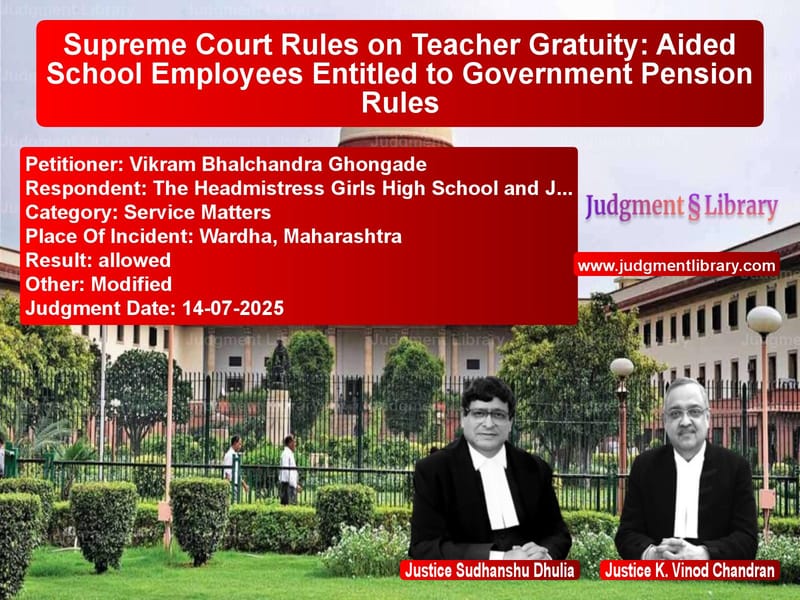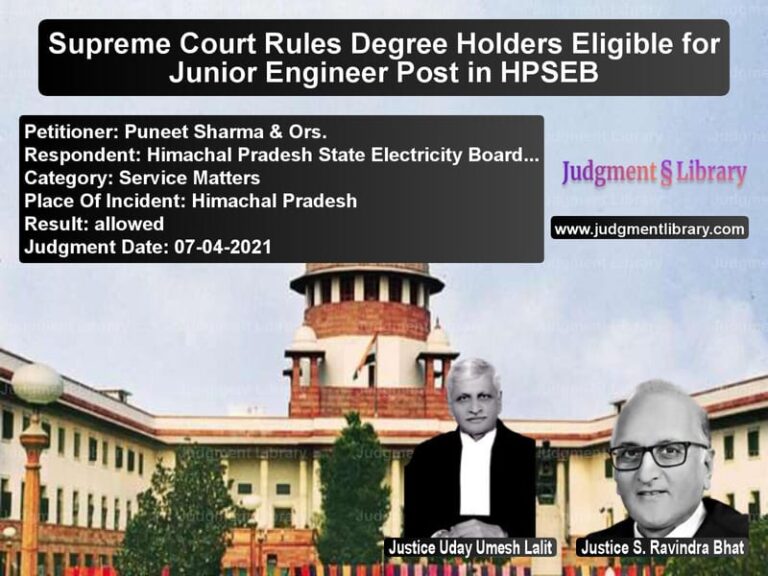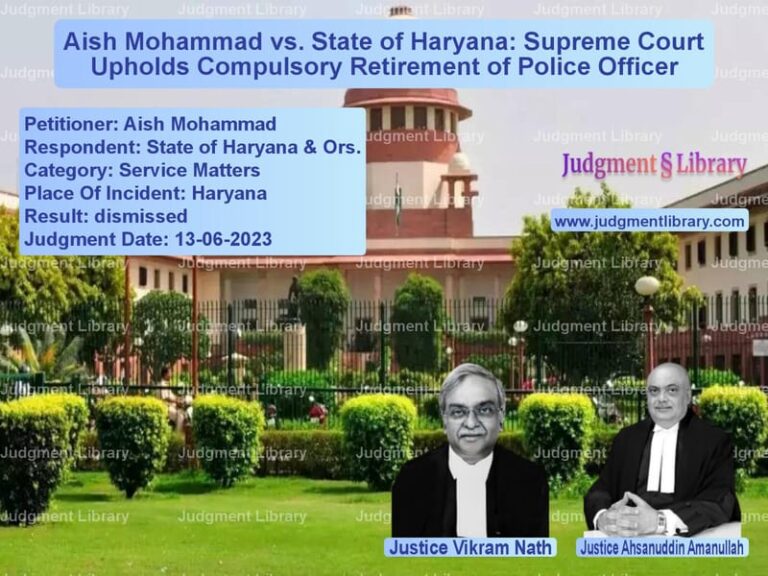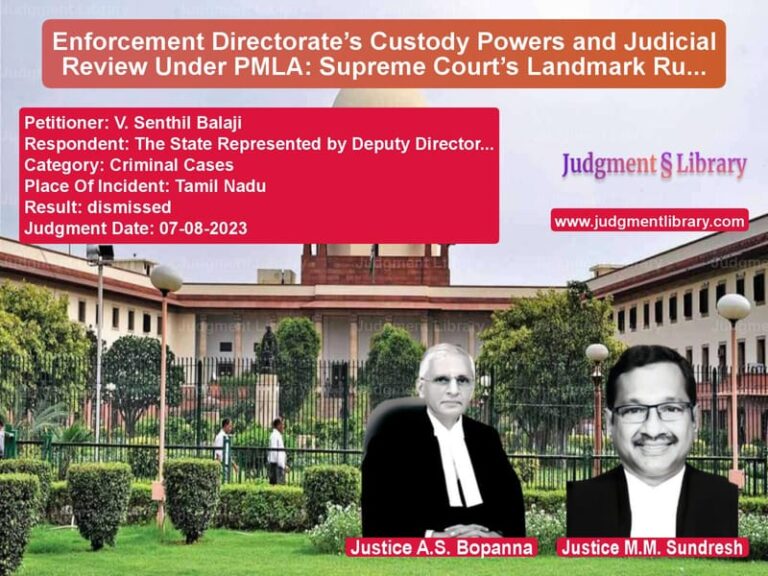Supreme Court Rules on Teacher Gratuity: Aided School Employees Entitled to Government Pension Rules
In a significant judgment that clarifies the rights of teachers in aided schools to retirement benefits, the Supreme Court has delivered a verdict balancing the interests of educational staff and government regulations. The case involved Vikram Ghongade, son of a deceased teacher from an aided school in Wardha, Maharashtra, who claimed gratuity under the Payment of Gratuity Act, 1972 after his mother’s death during service.
The legal battle spanned multiple levels of judiciary, with the petitioner appearing in person to argue his case before the Supreme Court. The dispute centered around whether teachers in government-aided schools should receive gratuity under the general Payment of Gratuity Act or under specific Maharashtra Civil Services Rules that govern government employees.
The Petitioner’s Arguments
Vikram Ghongade argued passionately for his claim, pointing out that the school has settled the General Provident Fund dues in his name clearly mentioning him as nominee and the question of legal heirship certificate never arose. He relied heavily on the precedent set in Birla Institute of Technology v. State of Jharkhand, which clearly held that teachers are eligible for gratuity under the Act.
The petitioner contended that without an exemption with respect to the schools in Maharashtra, the Gratuity Act cannot be made inapplicable. He further argued that the exemption under sub-rule (5) of Rule 4 does not apply since the gratuity payable under the Act is far more beneficial than the scheme under the Rules of 1982.
The Government’s Position
The learned Government Advocate presented the state’s perspective, arguing that being an aided school, the employees are paid pay & allowances, while in service, by the Government so is the pensionary benefits including Death-cum-Retirement Gratuity (DCRG) paid under the Maharashtra Civil Services (Pension Rules), 1982 brought out under Article 309 of the Constitution of India.
The government also raised procedural concerns, noting that the petitioner admits that his father is surviving, who would also be a legal heir of the deceased. The petitioner hence has to produce a legal heir certificate and the claim of the father will also have to be dealt with. This argument highlighted the complexity of family claims in death benefit cases.
The Court’s Analysis of Legal Framework
The Supreme Court conducted a thorough examination of the competing legal frameworks. On the fundamental question of teachers’ entitlement to gratuity, the Court unequivocally stated that the decision in Birla Institute of Technology puts to rest any such controversy. However, the real question was which scheme would apply to aided school teachers.
The Court made a crucial observation about the nature of employment in aided schools, noting that a teacher in an aided school for all practical purposes is akin to a post under the State Government. The judgment elaborated that the posts in aided schools are either sanctioned by the Government or approved in accordance with the Rules and pay and allowances are also paid by the Government.
Comparative Analysis of Benefits
The Court conducted a detailed comparison between the benefits available under the Payment of Gratuity Act, 1972 and the Maharashtra Civil Services (Pension) Rules, 1982. The Court emphasized that the scheme has to be considered in toto for the purpose of determining as to which is more beneficial.
The judgment noted that the Act of 1972 prescribes under Section 4(2), gratuity at the rate of 15 days wages based on the last wages drawn for every completed year of service or part thereof in excess of six months. In contrast, the Rules of 1982 is concerned, gratuity is payable equal to ¼ th of last pay drawn of each completed six monthly period of qualifying service, subject to a maximum of 16 and a half years.
The Court made a significant observation about the practical advantages of the government scheme, particularly in cases of early death: on death prior to the minimum period, the gratuity payable under the Rules of 1982 is far more than that applicable under the Act of 1972. The judgment provided a detailed comparison table showing that for employees with less than five years of service, the government scheme offers substantially better benefits.
Legal Heirship and Nomination Issues
One of the key procedural hurdles in the case was the requirement for a legal heirship certificate. The petitioner had argued that he was estranged from his father, but the Court took a practical approach to this sensitive family matter.
The Court made a crucial determination about the nomination process, stating that we find absolutely no reason to direct the petitioner to produce a legal heirship certificate since in any case the payment made to a nominee or one of the legal heirs, when there are also other legal heirs left behind, is in trust and the person who receives the payment as a nominee holds the money in trust for all the others.
This reasoning acknowledged the practical realities of family disputes while ensuring that legitimate claims are processed efficiently. The Court clarified that the nomination made by the deceased employee while she was alive only absolves the employer from finding out the different legal heirs for the purpose of making payments apportioning their separate shares.
Court’s Final Directions
In its concluding remarks, the Supreme Court provided clear directions for the implementation of its judgment. The Court ordered that the petitioner shall approach the first respondent with an application for payment of DCRG in accordance with the Rules of 1982 along with an undertaking to indemnify the Government and the Society which runs the aided school from any claims made by any other legal heir, by a notarised affidavit.
Recognizing the delay in payment, the Court also mandated that the petitioner shall also be paid simple interest @ 7% per year, starting from one month of the date of death of the employee, till the date of payment. This interest provision serves as both compensation for the delay and an incentive for timely processing of claims in future cases.
Broader Implications
This judgment has significant implications for thousands of teachers employed in government-aided schools across Maharashtra and potentially other states with similar legal frameworks. The Court’s reasoning that there cannot be a situation where the teachers of aided schools are entitled to a different computation of gratuity under the Act of 1972 establishes an important principle of parity in benefits for similarly situated employees.
The Court’s pragmatic approach to the legal heirship certificate requirement sets a helpful precedent for future cases involving family disputes over death benefits. By emphasizing the trustee nature of nominations, the judgment balances administrative efficiency with protection of all legal heirs’ rights.
This case also highlights the importance of comparing benefit schemes holistically rather than focusing on isolated advantages. The Court’s comprehensive analysis of both schemes demonstrates that what might appear more beneficial for one category of employees (those with long service) may be less beneficial for others (those with shorter service periods).
The Supreme Court’s decision ultimately provides clarity on a long-standing ambiguity in the rights of aided school teachers while ensuring that the most beneficial scheme applies to protect the interests of employees and their families during difficult times of bereavement and financial uncertainty.
Petitioner Name: Vikram Bhalchandra Ghongade.Respondent Name: The Headmistress Girls High School and Junior College, Anji (Mothi), Tah. and Distt. Wardha & Ors..Judgment By: Justice Sudhanshu Dhulia, Justice K. Vinod Chandran.Place Of Incident: Wardha, Maharashtra.Judgment Date: 14-07-2025.Result: allowed.
Don’t miss out on the full details! Download the complete judgment in PDF format below and gain valuable insights instantly!
Download Judgment: vikram-bhalchandra-g-vs-the-headmistress-gir-supreme-court-of-india-judgment-dated-14-07-2025.pdf
Directly Download Judgment: Directly download this Judgment
See all petitions in Pension and Gratuity
See all petitions in Public Sector Employees
See all petitions in Employment Disputes
See all petitions in Termination Cases
See all petitions in Judgment by Sudhanshu Dhulia
See all petitions in Judgment by K. Vinod Chandran
See all petitions in allowed
See all petitions in Modified
See all petitions in supreme court of India judgments July 2025
See all petitions in 2025 judgments
See all posts in Service Matters Category
See all allowed petitions in Service Matters Category
See all Dismissed petitions in Service Matters Category
See all partially allowed petitions in Service Matters Category







